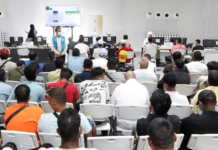By Anthon Garcia
During the recently concluded GITEX GLOBAL event in Dubai, groundbreaking digital city innovations were showcased that provided a glimpse into how advanced technologies like AI, cloud computing, cybersecurity, and edge computing are shaping tomorrow’s urban landscapes. These technologies are not only transforming cities but are pivotal for driving global economic growth.
Why Build Digital Cities
While old and traditional cities will never become obsolete, they do offer some challenges. According to Martin Yates, Govt Tech Advisor at Presight of UAE, “legacy cities like New York face hurdles due to outdated infrastructure, such as old pipes and cables, requiring time-consuming upgrades. In contrast, building new cities offers a faster path to optimization, as they can install modern infrastructure from the start, achieving high efficiency within three to five years. The timeline also varies with city size – a smaller town can adapt more quickly, whereas larger cities require more time and resources. Ultimately, the pace of progress depends on the scale and resources available.” In some ways, building a new digital city from scratch is a kind of shortcut.
The Role of AI in Urban Transformation
Artificial intelligence is at the heart of digital city transformation, enabling smart traffic systems, real-time data analytics, and automation that enhances urban mobility, reduces congestion, and improves public safety. By analyzing vast amounts of urban data, AI allows city planners to make informed decisions on resource allocation, infrastructure investments, and operational efficiency. The integration of AI also contributes to economic growth by boosting productivity, creating new job opportunities, and enabling the development of smart solutions that cater to citizens’ needs in real-time.
Cloud Computing: Enabling Scalable, Interconnected Digital Cities
As digital cities scale, cloud computing provides the infrastructure necessary for seamless data storage, real-time access, and global interconnectivity. By leveraging multi-cloud architectures, cities can access the best offerings from multiple cloud providers while avoiding vendor lock-in and minimizing costs. Cloud technology also plays a vital role in supporting applications that require massive data processing and storage, such as digital twins for urban planning.
Cybersecurity: Safeguarding Digital Infrastructure and Public Trust
With the digital transformation of cities comes the pressing need for cybersecurity. Protecting sensitive data and ensuring privacy are essential as cities become more interconnected and rely on data-driven systems. At GITEX GLOBAL, experts emphasized cybersecurity’s importance, not only to prevent data breaches but also to maintain public trust, a critical factor for successful digital adoption. Strong cybersecurity measures also provide a foundation for economic growth by safeguarding city infrastructures, ensuring continuity, and fostering confidence among residents and businesses.
Edge Computing: Pushing Data Processing Closer to the Source
Edge computing is revolutionizing how data is processed within digital cities by bringing computation closer to data sources, reducing latency, and enhancing response times. This approach is particularly beneficial for applications that require instant data processing, such as autonomous vehicles, smart grids, and public safety systems. By minimizing data transfer to centralized cloud servers, edge computing reduces costs and ensures faster, more reliable services. The impact on economic growth is significant, as edge computing enables cities to implement a broader range of smart solutions that improve service delivery and create new revenue streams.
UAE’s Commitment to Digital City Leadership
The UAE, particularly Dubai and Abu Dhabi, is rapidly advancing as a leader in digital city innovation. Initiatives like Dubai’s Paperless Strategy, smart traffic systems, and scannable robots for city planning highlight how technology-driven projects can create sustainable, hyper-connected urban environments. Through strategic partnerships and government support, the UAE aims to strengthen its technological infrastructure, contributing to a vibrant digital economy that boosts national competitiveness and supports global economic growth.
As demonstrated at GITEX GLOBAL, AI, cloud computing, cybersecurity, and edge computing are essential for building resilient, efficient, and sustainable digital cities. These technologies not only improve urban living but drive substantial economic growth by creating new business opportunities, enhancing productivity, and enabling scalable, flexible solutions. The UAE’s commitment to digital transformation offers a model for how nations can capitalize on technology to secure their place in a rapidly evolving global economy.








































